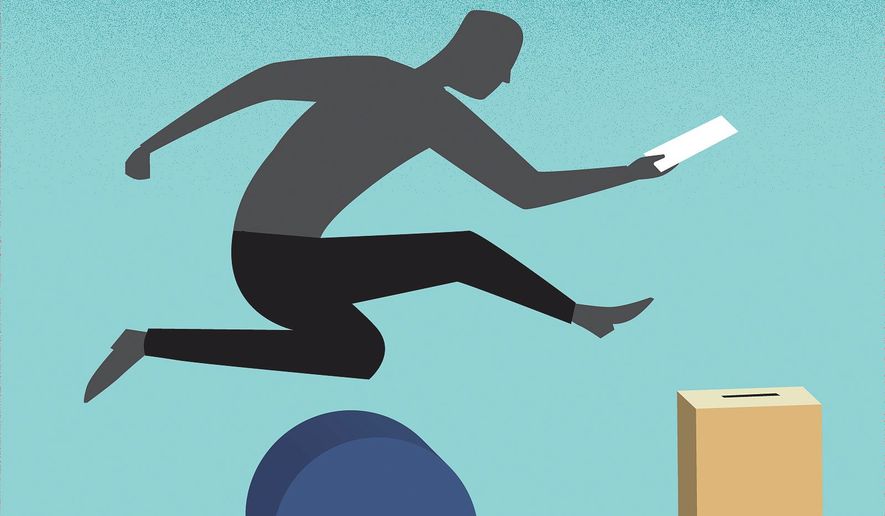OPINION:
The U.S. Postal Service is a vital institution but hardly healthy, and the election-year histrionics — House Democrats verbally keelhauling Postmaster General Louis DeJoy and candidates and state attorneys general suing to ensure adequate resources for mail-in ballots — are demagoguery.
Like UPS, FedEx and Amazon, COVID-19 has stretched USPS resources to keep workers healthy at processing centers and in customer-facing roles, and compensate for curtailed commercial airline flights, which carry packages along with luggage.
First class, two-day performance is running at about 92.4%. That’s only 1.5 points below last year, and anyone who uses Amazon and UPS for household items during the coronavirus crisis knows that’s darn good.
At most, mail-in ballots will constitute 1% or 2% of the normal mail flow, and the Postal Service has adequate liquidity through April. It has urged voters to request mail-in ballots at least 15 days prior to Election Day — hardly an onerous requirement.
Only five states — Colorado, Hawaii, Oregon, Washington and Utah — routinely conducted all mail-in elections prior to the crisis. Four others and the District of Columbia have promised to mail ballots to all registered voters, and many states allow voters to request an absentee ballot, with only a small number requiring voters to state a reason.
To mail every qualified voter a ballot — most without their specific request — requires election officials to determine who on their voter rolls has moved or died — a herculean task for states without established systems. Ballots sent to dead people or those who have left households can easily be forged.
If Democrats thought Republicans were advantaged by mail-in voting, I am certain they would find a professor some place to gin up a study to place before a federal judge that shows minorities were disadvantaged.
Since 2000, first-class mail volume has fallen by about half, and fliers and packages have not picked up the slack — overall pieces handled are down by more than 30%. Consequently, the service has too many free-standing retail locations, processing centers and mail collection boxes that hardly get used. Mr. DeJoy is merely seeking to implement reforms recommended by independent studies prior to his appointment.
Political pressure from Congress keeps the Postal Service from closing post offices and raising prices to the extent costs require and competition permits. Skipping Saturday mail delivery, which elicits outrage on Capitol Hill whenever the idea is floated, would hardly help much.
Last year, the Postal Service lost $8.8 billion, and ending Saturday delivery would save less than $2 billion. It has unfunded pensions and debts exceeding $160 billion, and taxpayers either have to bail it out or forsake guaranteed delivery to every address in the United States — including the mule haul to a few hearty souls at the bottom of the Grand Canyon.
The myth could be continued by printing money — the Treasury can keep lending the service money and the Federal Reserve can keep buying the additional debt. But it’s time to recognize that the Internet age offers the country more efficient ways to deliver utility bills, notices from the IRS and other documents.
A comprehensive platform could be accomplished by assigning everyone a lifetime email address that would forward to Gmail and other commercial accounts, permitting ordinary individuals and businesses to open accounts at the Federal Reserve just as commercial banks do, and developing a comprehensive app. Consider how Tencent created WeChat in China, which permits just about everything — messaging, marketing and payments all on one platform.
Also, consider how costly to the environment of so many bills round tripping imposes in paper, printing, ink and motor vehicle emissions — all that CO2 and other pollution is needless.
Ensuring that every household has reasonable access to the Internet is not a herculean task; we did the same for landline telephones in the 20th century. For the few cases where that is not yet technologically feasible a more limited, first-class mail delivery system, perhaps three days a week, would suffice.
That service could be subsidized as needed, and the Postal Service unleashed to charge whatever it likes for fliers and packages to compete with UPS, FedEx and the others. If those services sink, let them.
As for voting, beyond this election, state officials would be much more likely to create accurate rolls and secure balloting if they did so electronically through the Internet than keeping paper registers that are updated only when dead folks fail to show up to the polls.
• Peter Morici, @pmorici1, is an economist and emeritus business professor at the University of Maryland, and a national columnist.




Please read our comment policy before commenting.